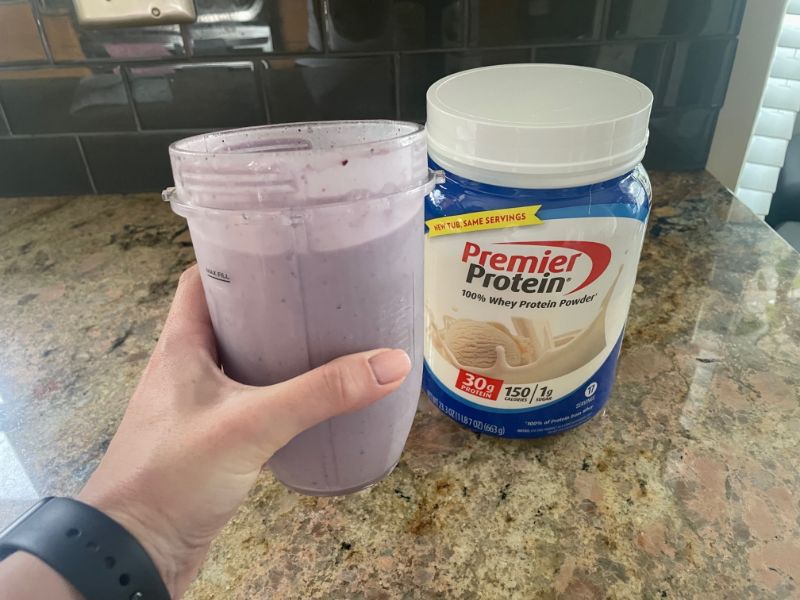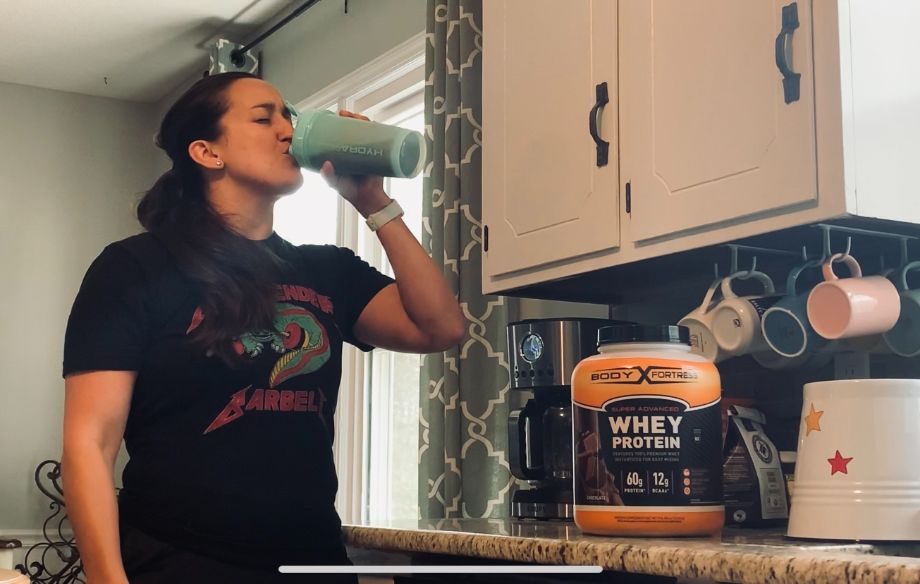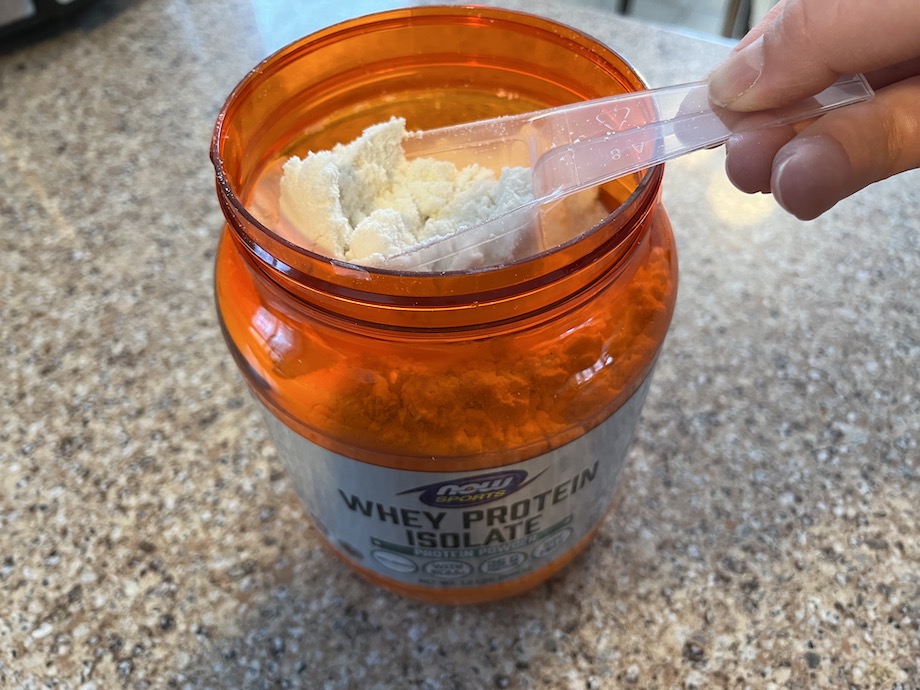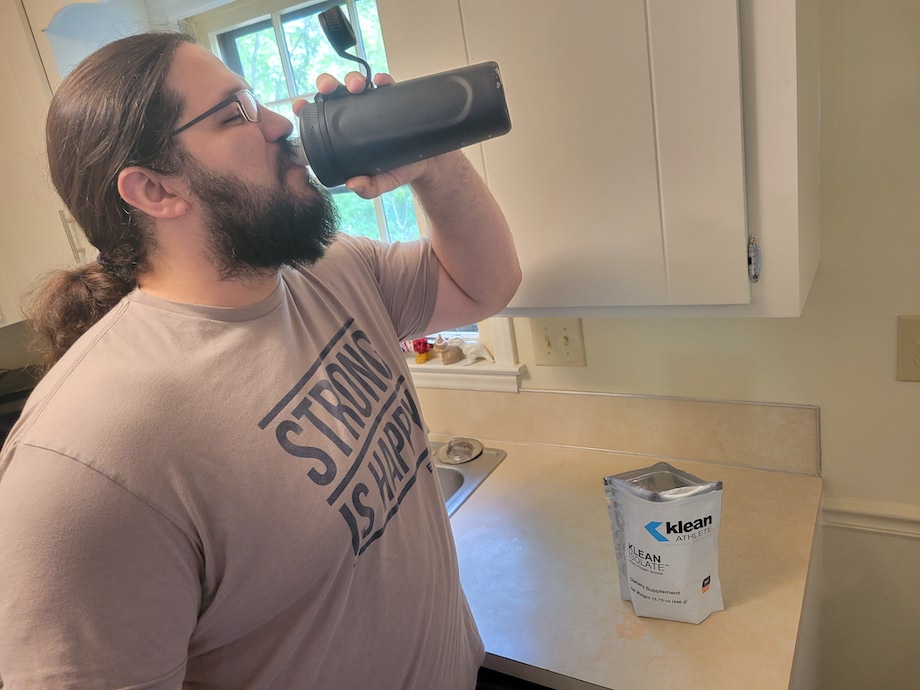We test and review fitness products based on an independent, multi-point methodology. If you use our links to purchase something, we may earn a commission. Read our disclosures.
You’ve got the perfect workout plan, you’re wearing a sweat-wicking outfit, you’ve prepped your high-protein meals for the week, and you’ve found a great-tasting protein powder, but you still have an unanswered question about your fitness routine—should you drink a protein shake before or after a workout?
Optimizing your protein intake is an undeniably important component of any training program, and protein timing is an important consideration when trying to get the best possible results from your hard work.
How much does the timing of your protein intake really matter? In this article, we’ll discuss the current evidence on the best time to drink a protein shake and help you decide which strategy is right for you.
Medical disclaimer: This article is intended for educational and informational purposes only. It is not intended as a substitute for medical advice. For health advice, contact a licensed healthcare provider.
Short Answer: Should You Drink a Protein Shake Before or After a Workout?
Drinking a protein shake either pre- or post-workout can help you meet your protein goals for building muscle, gaining strength, improving body composition through fat loss, or improving athletic performance.
Based on the available research, it doesn’t matter much whether you drink a protein shake before or after a workout as long as you’re meeting your daily protein needs and spreading your protein intake evenly throughout the day.

Benefits of Drinking a Protein Shake Before a Workout
Pre-workout protein shakes are a quick, convenient way to ensure you have something in your stomach, which can be useful for people who feel nauseous or weak if they don’t eat anything before working out.
Drinking a protein shake before a workout can also be helpful if you know you won’t have time to eat a meal or drink a shake for a few hours after working out.
RELATED: Best Protein Powder
Having a protein shake before a training session can help fuel you during exercise by providing the body with a source of energy. Carbohydrates are the preferred energy source during exercise, however, so a protein shake isn’t necessarily better than eating a pre-workout snack or meal.
Some people claim that having a pre-workout protein shake is better than post-workout protein for muscle growth because of the idea that having more amino acids in the bloodstream during a workout leads to greater muscle protein synthesis. This seems plausible, but research doesn’t seem to back it up. According to a 2013 meta-analysis1 in the Journal of the International Society of Sports Nutrition, taking protein before a workout was equally as effective as post-workout protein for gaining muscle and strength.
So while drinking protein before a workout is helpful, its benefits are primarily due to its contribution to your total protein needs that day and it isn’t inherently more advantageous than consuming protein after exercise.
Benefits of Drinking a Protein Shake After a Workout
As with pre-exercise protein consumption, drinking protein after a workout can also help you meet your daily protein target and stimulate muscle protein synthesis after resistance or strength training.

You probably don’t need to worry about drinking your protein shake immediately after you exercise, though, as a 2020 review2 in Nutrients and a 2018 review3 in the Journal of Orthopaedic and Sports Physical Therapy both concluded that the period of time during which the body’s muscle-building potential is increased (commonly referred to as the “anabolic window”) lasts for a while, up to 24 to 48 hours after working out.
Do you feel nauseated or weighed down when you exercise right after eating? If so, a post-exercise protein shake can help prevent these uncomfortable symptoms and help you to feel your best in the gym, allowing you to train more effectively.
How Much Protein Do I Need?
The minimum amount of protein needed to prevent protein deficiency for a sedentary person is 0.8 grams per kilogram of body weight per day. This is known as the Recommended Dietary Allowance (RDA) and equates to 55 grams of protein for a person weighing 150 pounds.
RELATED: How Much Protein Do I Need?
If you’re physically active, however, you’ll need more protein than this. Higher-protein diets have consistently been shown to be more effective for building muscle and strength. This is because protein-rich foods and protein supplements (including shakes) provide essential amino acids required by the body for muscle repair, muscle growth, and muscle recovery. These amino acids are considered the “building blocks” of protein and muscle.
Eating a higher-protein diet (in combination with resistance training) can also prevent some of the muscle loss4 that naturally occurs when losing weight, since a higher proportion of your calorie intake will be used to maintain muscle tissue rather than your fat stores.
So how much protein do you really need? It will vary based on a number of factors, such as your weight, metabolic rate, fitness or performance goals, and the amount of exercise in which you regularly participate.

To build lean muscle during resistance training, the American College of Sports Medicine5 recommends 1.2 to 1.7 grams of protein per kilogram of body weight. Similarly, a 2018 meta-analysis in the British Journal of Sports Medicine6 found that consuming up to 1.6 grams of protein per kilogram was most effective for building muscle mass. Eating more than this amount didn’t provide any additional benefit.
If your goal is to eat more protein to lose weight while minimizing muscle loss, eating between 1.6 to 2.4 grams of protein per kilogram you weigh may be the most helpful. For people in larger bodies with BMIs that fall in the overweight or obesity category, a 2015 review7 in the American Journal of Clinical Nutrition suggests that getting 1.2 to 1.6 grams of protein per kilogram every day is optimal.
RELATED: How Much Protein Is Too Much?
Daily Protein Intake Matters Most
While the optimal timing for protein intake is still being researched, many experts advise that getting enough total protein each day likely plays a bigger role than whether you drink protein before or after a workout.
This is because drinking a protein shake without giving much thought to the quality of the rest of your diet could leave potential gains on the table. To build muscle, you need to be in a state of positive nitrogen balance—meaning that you’re consuming more nitrogen (found in high-protein foods) than you’re losing through urine. This ensures an adequate supply of amino acids for building muscle. If you aren’t eating enough protein each day, you’ll be in a state of negative nitrogen balance which can lead to muscle loss.
And keep in mind that your total protein intake isn’t the only important factor—spreading your protein intake from meals and shakes evenly throughout the day is also key. The ability of the body to utilize dietary protein for muscle protein synthesis appears to be capped at around 30 to 40 grams of protein at once, so eating more than this at one meal won’t provide you with any extra muscle building gains.
Instead, it’s recommended to consume about 25 to 30 grams of high-quality protein in every meal or shake for weight loss and weight maintenance. For muscle gain, the International Society of Sports Medicine8 recommends getting 20 to 40 grams every 3 to 4 hours. A standard protein shake will provide you with this amount of protein, whether made from whey protein, casein protein, or plant-based protein.
Should You Drink a Protein Shake Before or After a Workout? Final Thoughts
Drinking a protein shake before or after a workout are both effective strategies for meeting your health and fitness goals and initiating the muscle building process. That said, protein shakes are most helpful when used to meet your total daily protein requirements and as a way to spread your protein intake evenly throughout the day in combination with balanced meals.
Ultimately, the best time to drink a protein shake will depend on your schedule, the timing of your meals, and your ability to tolerate exercising on a full or empty stomach. Don’t get caught up in claims about a 30-minute anabolic window—you’ll still see progress toward your goals without rushing to chug a protein shake.
Still looking for a great protein powder? Check out our picks for the best protein powder!
Should You Drink a Protein Shake Before or After a Workout? Q&A
Is it better to drink protein shakes before or after a workout?
There isn’t much difference between drinking pre- or post-workout protein shakes in terms of building muscle or improved athletic performance. Getting enough total protein from a variety of protein sources each day should be your main focus.
Drinking a protein shake before a workout can be helpful if you haven’t eaten within a few hours and don’t feel great exercising on an empty stomach, or if you know you won’t be able to eat for a while after working out. On the other hand, drinking protein after a workout is great for people who like exercising in a fasted state or who find it inconvenient to eat or drink a shake before they work out.
How long before a workout should I drink a protein shake?
There aren’t any specific recommendations as to how long before a workout you should drink a protein shake. Spreading your protein intake throughout the day is important, so avoid drinking a protein shake too soon after a meal. If you feel nauseated when working out right after eating, drink your protein shake at least an hour before you hit the gym. Pay attention to any unpleasant digestive symptoms and adjust your protein timing as needed.
When should I drink a protein shake?
It’s your choice whether you want to drink a protein shake before or after a workout. Since both of these strategies contribute to your total protein intake for the day, they can both be helpful for increasing muscle size, gaining strength, or losing weight.
Should I eat protein before or after a workout to lose weight?
It’s your choice whether you want to drink a protein shake before or after a workout to lose weight. Both strategies are effective for minimizing muscle loss while losing weight by helping you meet your daily protein needs.
These statements have not been evaluated by the Food and Drug Administration. This product is not intended to diagnose, treat, cure, or prevent any diseases.
References
- Schoenfeld BJ, Aragon AA, Krieger JW. The effect of protein timing on muscle strength and hypertrophy: a meta-analysis. J Int Soc Sports Nutr. 2013;10(1):53. Published 2013 Dec 3. doi:10.1186/1550-2783-10-53
- Arent SM, Cintineo HP, McFadden BA, Chandler AJ, Arent MA. Nutrient Timing: A Garage Door of Opportunity?. Nutrients. 2020;12(7):1948. Published 2020 Jun 30. doi:10.3390/nu12071948
- Schoenfeld BJ, Aragon AA. Is There a Postworkout Anabolic Window of Opportunity for Nutrient Consumption? Clearing up Controversies. J Orthop Sports Phys Ther. 2018;48(12):911-914. doi:10.2519/jospt.2018.0615
- Moon J, Koh G. Clinical Evidence and Mechanisms of High-Protein Diet-Induced Weight Loss. J Obes Metab Syndr. 2020;29(3):166-173. doi:10.7570/jomes20028
- American College of Sports Medicine. Protein Intake for Optimal Muscle Maintenance. https://www.acsm.org/docs/default-source/files-for-resource-library/protein-intake-for-optimal-muscle-maintenance.pdf. Accessed 6/22/23.
- Morton RW, Murphy KT, McKellar SR, et al. A systematic review, meta-analysis and meta-regression of the effect of protein supplementation on resistance training-induced gains in muscle mass and strength in healthy adults [published correction appears in Br J Sports Med. 2020 Oct;54(19):e7]. Br J Sports Med. 2018;52(6):376-384. doi:10.1136/bjsports-2017-097608
- Leidy HJ, Clifton PM, Astrup A, et al. The role of protein in weight loss and maintenance. Am J Clin Nutr. 2015;101(6):1320S-1329S. doi:10.3945/ajcn.114.084038
- Kerksick CM, Arent S, Schoenfeld BJ, et al. International society of sports nutrition position stand: nutrient timing. J Int Soc Sports Nutr. 2017;14:33. Published 2017 Aug 29. doi:10.1186/s12970-017-0189-4
Further reading

Weight plates are a staple in any home gym. With them, you can perform virtually any exercise you can think of. The best weight plates will resist damage, have minimal to no bounce, fit snugly on anOlympic barbell, and look good while you’re smashing PRs left and right. In truth, the “best” weight plates will be different for everyone and which plates are the best for you depends largely on your training style and goals, yourhome gym setup, and your budget. This guide to weight plates should help you make a smart decision. RELATED: The Best Barbells for Your Home Gym in 2021 Read more

Looking to build strength while getting your heart pumping? Our kettlebell workout program accomplishes both. Read more

In our NOBULL apparel reviews, we cover our experience with some newer items from NOBULL in addition to some classic pieces. Read more

If you struggle with bloat, GGR has your back—and front! Our nutrition team reviewed the best greens powder for bloating to keep swelling to your biceps. Read more

